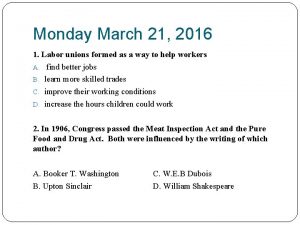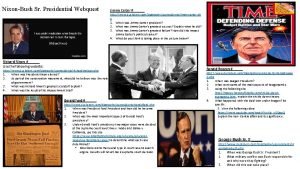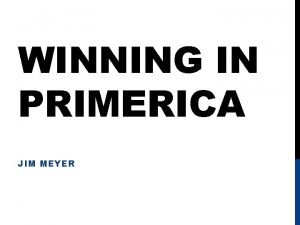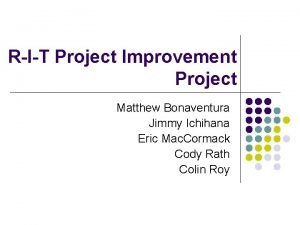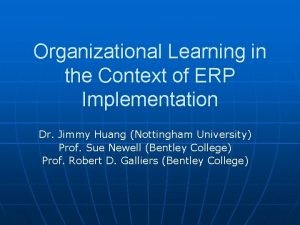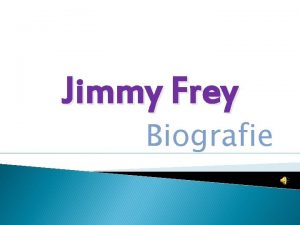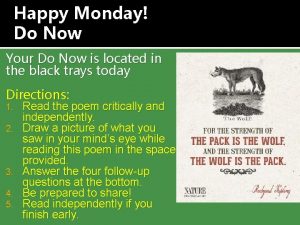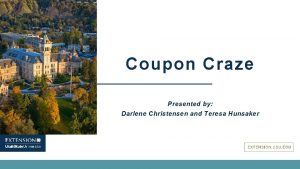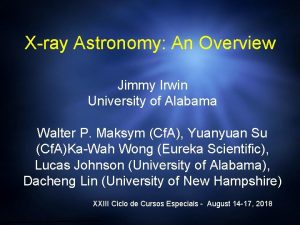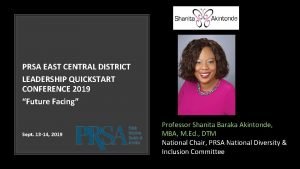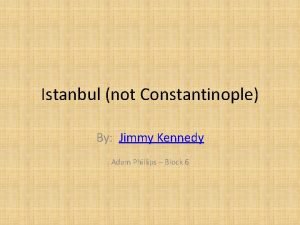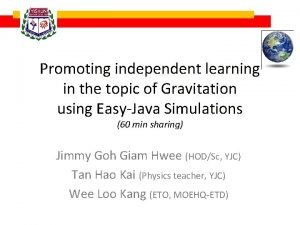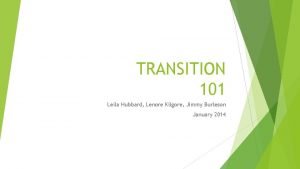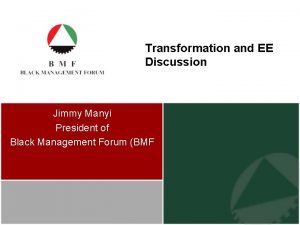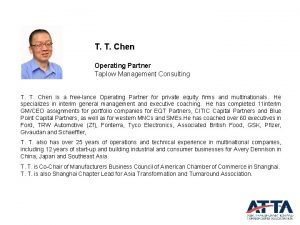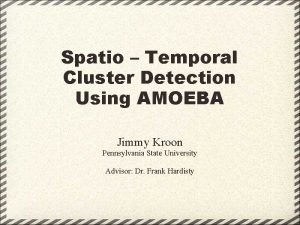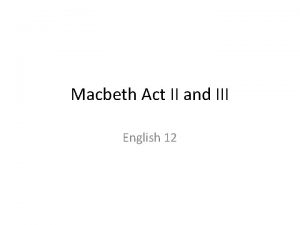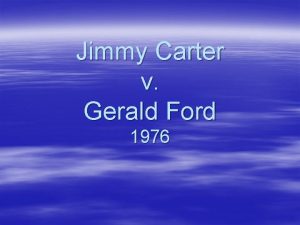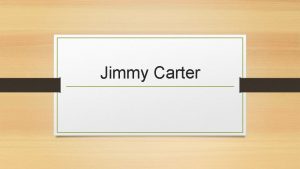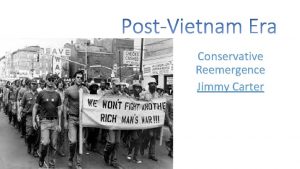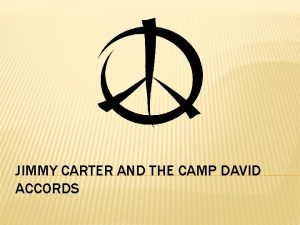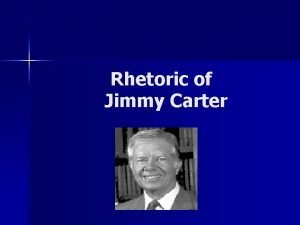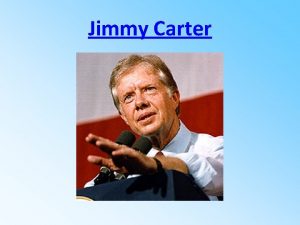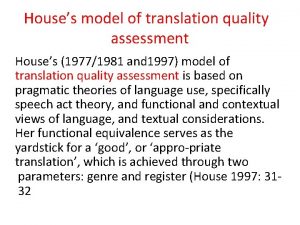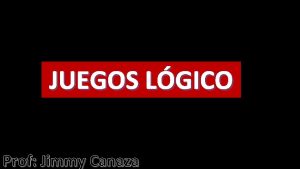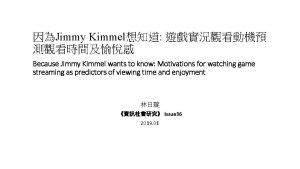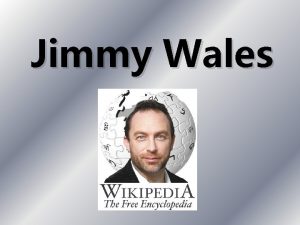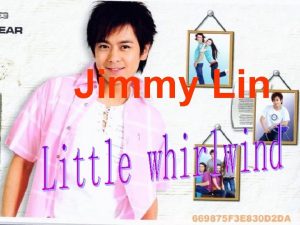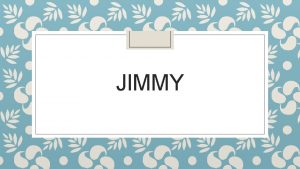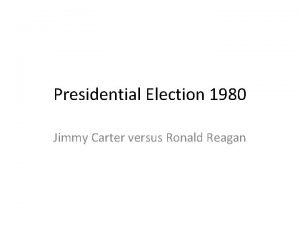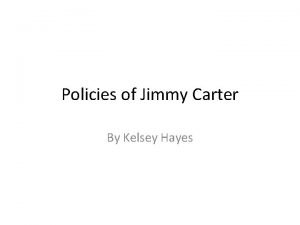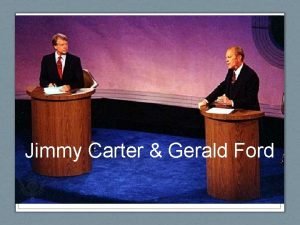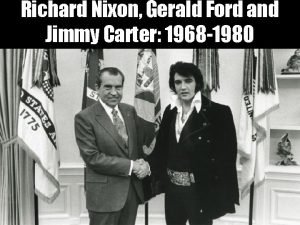Jimmy Carter 19771981 A 2 Questions 1 To






















- Slides: 22

Jimmy Carter (19771981) A 2

Questions: 1. To what extent did Cold War Policies under Carter hinder U. S. - Latin American relations? 2. Assess the success of the 4 major activities (“goals”) of the Department of Education. 3. Describe the Emergency Petroleum Allocation Act and National Energy Plan.

Cold War Policies- Limited NATO- North Atlantic Treaty Organization is a military alliance based on the North Atlantic Treaty to protect the freedom of its members and to defend against weapons of mass destruction, terrorism, and cyber attacks. Sought improved relations with possible adversaries and develop east-west relations

Cold War Policies- Limited NATO Following expanding power of the Soviet Union beyond the North Atlantic area, the activities of the Soviet Union and Cuba in Africa are preventing those countries from determining their own course ● Soviet Union poses a military threat to the alliance which exceeds their security needs, military lead of the U. S. has been reduced as a result.

Cold War Policies- Limited NATO The mutual pledge of trust of NATO was diminishing, if Soviet Union continued to expand it would be hard to counter the military threat. While the U. S. supports helping countries as these actions will have a longterm interest for the NATO alliance, Carter sets up a proposal to limit strategic arms.

Cold War Policies- Panama Canal As part of Carter’s foreign policy… American control of the Panama Canal (since 1914) had been a source of conflict between the two countries In 1977 it was agreed with Panama’s leader Omar Torrijos that Panama would take control of the canal by 1999 - It should remain neutral by being open to all countries but U. S. would maintain a military presence

Cold War Policies- Panama Canal The senate approved the treaty but with some tension as Republicans claimed “We built it, we paid for it, we’re going to keep it” To some people this represented loss of American control

Cold War Policies- Cuts $ to Chile, Arg. and Guatemala ● Carter was outspoken on human rights in his campaign (due to his religious beliefs and morals, recognition of the national mood post- Vietnam/ post- Watergate). He recognized that the human rights issue could garner support from everyone “To me, the demonstration of American idealism was a practical and realistic approach to foreign affairs, and moral principles were the best foundation for the exertion of American power and influence. ” (Schmidli 365)

Cold War Policies- Cuts $ to Chile, Arg. and Guatemala The issue of human rights played a major role in the committee’s (House Committee on Appropriations- aims to keep tax dollars where they are needed most) consideration of military aid programs. Societies torn by civil conflict and ruled by a paranoid and prideful military reacting from previous U. S. interventions

Cold War Policies- Cuts $ to Chile, Arg. and Guatemala Programs (U. S. military training and arms transfers) were reduced or eliminated, totaling $22, 500, 000 in Nicaragua, Argentina, Brazil, El Salvador, Guatemala, Ethiopia, and the Philippines because of alleged human rights violations. - Motivated human rights groups in LA, provoked solidarity U. S. was moving away from its presence in Latin American countries popular of the Cold War Era (dominate and stop communism/ insert itself into many countries politics)

Cold War Policies- Cuts $ to Chile, Arg. and Guatemala However, due to the 1979 coup in El Salvador, U. S. feared the Domino Effect in Central America Carter’s promises of backing out were unfulfilled as response to continued HR violations: - More containment policies which altered nothing in regards to U. S. - LA relations.

Domestic Policies: 1970’s Energy Crisis - Major industrial countries (U. S. , Canada, Western Europe etc) faced significant petroleum shortages as well as elevated prices. - Emergency Petroleum Allocation Act and Energy Plan were created/passed. - NEP proposed centralization of policy planning, stronger regulations on energy production, federal funding for energy research & more. - EPAA would require the president to allocate crude oil and refined petroleum products to deal with shortages and dislocations. (Passed by Congress & House but never passed by the Senate) National

Domestic Policies: 1979 Department of Education - Department of Education Organization Act: created a federal Dept. Of Education, headed by a secretary of education. - Prior to the creation, there were national efforts to help racial minorities, women, people with disabilities & non english speaking students have equal access to education. - Department was created by combining several federal agencies and began operations in May 1980. - By mid-2010 the department has about 4, 300 employees and a budget of about $60 billion.

Domestic Policies: 1979 Department of Education As declared by Congress, the department has four major activities: 1. Establish policies relating to federal financial aid for education, administers the distribution of those funds and monitors their usage. Collects data and oversees research on American schools and gives this information to Congress, educators and general public. 1. Identifies major issues/problems in national education and focuses the national attention on them. Enforces federal laws prohibiting discrimination in programs/activities that receive federal funds and ensures every individual access to equal education.

Domestic Policies: 1980 Election & Reagan’s Moral Majority - Moral Majority: American political organization associated with the Christian Right and Republican Party. - M. M. played a key role in Republican presidential victories and they supported Reagan in the election against Carter. - Carter was deemed “too liberal” by the M. M. to be supported by them. - M. M. mainly based their support on a candidate's response to ERA, federal funding for abortions and school prayer.

Domestic Policies: 1980 Election & Reagan’s Moral Majority - Before the election, Reagan appointed the first executive director of the M. M. as his campaign’s religious advisor. - Reagan received 51% of the popular vote. 63% of the votes were from white born-again Christians. - More than ⅕ of M. M. supporters who previously for Carter, voted for Reagan in the 1980 election. voted

Domestic: 1977 National Energy Policy - Carter wants to reduce energy consumption Reduce gasoline (10%) consumption and reserve it (1 billion) Stop foreign oil, increase coil production and Nuclear Energy Insulate US homes and use solar energy in more than 2. 5 million homes Installs solar panel in White House Creates Department of Energy to focus environmental protection Creates Energy Research and Development Administration and Solar Energy Research Institute. Energy Plans fail as the Congress does not support them Due to oil boycott price raise and long lanes in gas stations

Domestic: Anti-Nuclear Energy Movement - People start protesting against nuclear power plants because of safety concerns and lifestyle changes - Reach more than 1 million people in protests - Three Mile Island meltdown happens - Carter who used to specialize in nuclear power says it was a minor mistake - The event was rated 5/7 International Event Scale - People and scientist starting protesting more ⇒ Nuclear Regulatory Commision (for new safety regulation).

Domestic: 1977 Tax Cuts - 1977’s Carter proposed 34$ billion dollars in Tax Cuts Invest 14$ billion in public works/services He reforms Social Security and national welfare Increases benefits, minimum wage and farmer support Unemployment decreases from 8% to 5. 8 1980’s unemployment increases to 7. 4 and 20% interest rate with the highest debt recorded. - Tries to lower military expenses and tax cuts - Economy still fails - He blames Americans for their own problems and loses support.

Questions: 1. To what extent did Cold War Policies under Carter hinder U. S. - Latin American relations? 2. Assess the success of the 4 major activities (“goals”) of the Department of Education. 3. Describe the Emergency Petroleum Allocation Act and National Energy Plan.

Citations Cold War Policies: Shouse, Aimee D. Presidents from Nixon through Carter, 1969 -1981: Debating the Issues in Pro and Con Primary Documents. Westport, CT: Greenwood Press, 2002 Schmidli, William Michael. "Institutionalizing Human Rights in U. S. Foreign Policy: U. S. -Argentine Relations, 1976 -1980. " Diplomatic History 35, no. 2 (April 2011): 351 -377. Academic Search Premier, EBSCOhost (accessed March 17, 2016) Carter, Jimmy. "The NATO Parley: A DEFENSIVE ALLIANCE. " Vital Speeches Of The Day 44, no. 17 (June 15, 1978): 521. History Reference Center, EBSCOhost (accessed March 17, 2016) Colby, Jason M. "“A Chasm of Values and Outlook”: The Carter Administration’s Human Rights Policy in Guatemala. " Peace & Change 35, no. 4 (October 2010): 561 -593. Academic Search Premier, EBSCOhost (accessed March 17, 2016). Andrew, Christopher M. For the President's Eyes Only: Secret Intelligence and the American Presidency from Washington to Bush. New York: Harper. Collins. Publishers, 1995.

Citations Domestic Policies: Zelizer, Julian E. Jimmy Carter. New York: Times Books/Henry Holt and, 2010. "An Overview of the U. S. Department of Education-- Pg 2. " An Overview of the U. S. Department of Education-- Pg 2. Accessed March 15, 2016. http: //www 2. ed. gov/about/overview/focus/what_pg 2. html. La. Feber, Walter, Richard Polenberg, and Nancy Woloch. The American Century: A History of the United States since the 1890 s. "Emergency Petroleum Allocation Act (1973 - H. R. 9681). " Gov. Track. us. Accessed March 15, 2016. https: //www. govtrack. us/congress/bills/93/hr 9681. Wilcox, Clyde. God's Warriors: The Christian Right in Twentieth-century America. Baltimore: Johns Hopkins University Press, 1992.
 Jimmy carter
Jimmy carter Ronald reagan ducksters
Ronald reagan ducksters Jimmy meyer primerica
Jimmy meyer primerica Jimmy ichihana
Jimmy ichihana Jimmy huang nottingham
Jimmy huang nottingham Tom waes viajes
Tom waes viajes Gadsden purchase jimmy fallon
Gadsden purchase jimmy fallon Jimmy frey woonplaats
Jimmy frey woonplaats Happy monday answer key
Happy monday answer key Coupon craze
Coupon craze Jimmy cournoyer
Jimmy cournoyer Jimmy irwin
Jimmy irwin Jimmy akintonde
Jimmy akintonde Lead singer of jimmy eat world
Lead singer of jimmy eat world Jimmy kennedy istanbul
Jimmy kennedy istanbul Jimmy goh giam hwee
Jimmy goh giam hwee French toast sticks sams
French toast sticks sams Jimmy burleson
Jimmy burleson Penulties
Penulties Jimmy chen eqt
Jimmy chen eqt Jimmy kroon
Jimmy kroon Jimmy maths
Jimmy maths Comic relief in macbeth act 1
Comic relief in macbeth act 1
